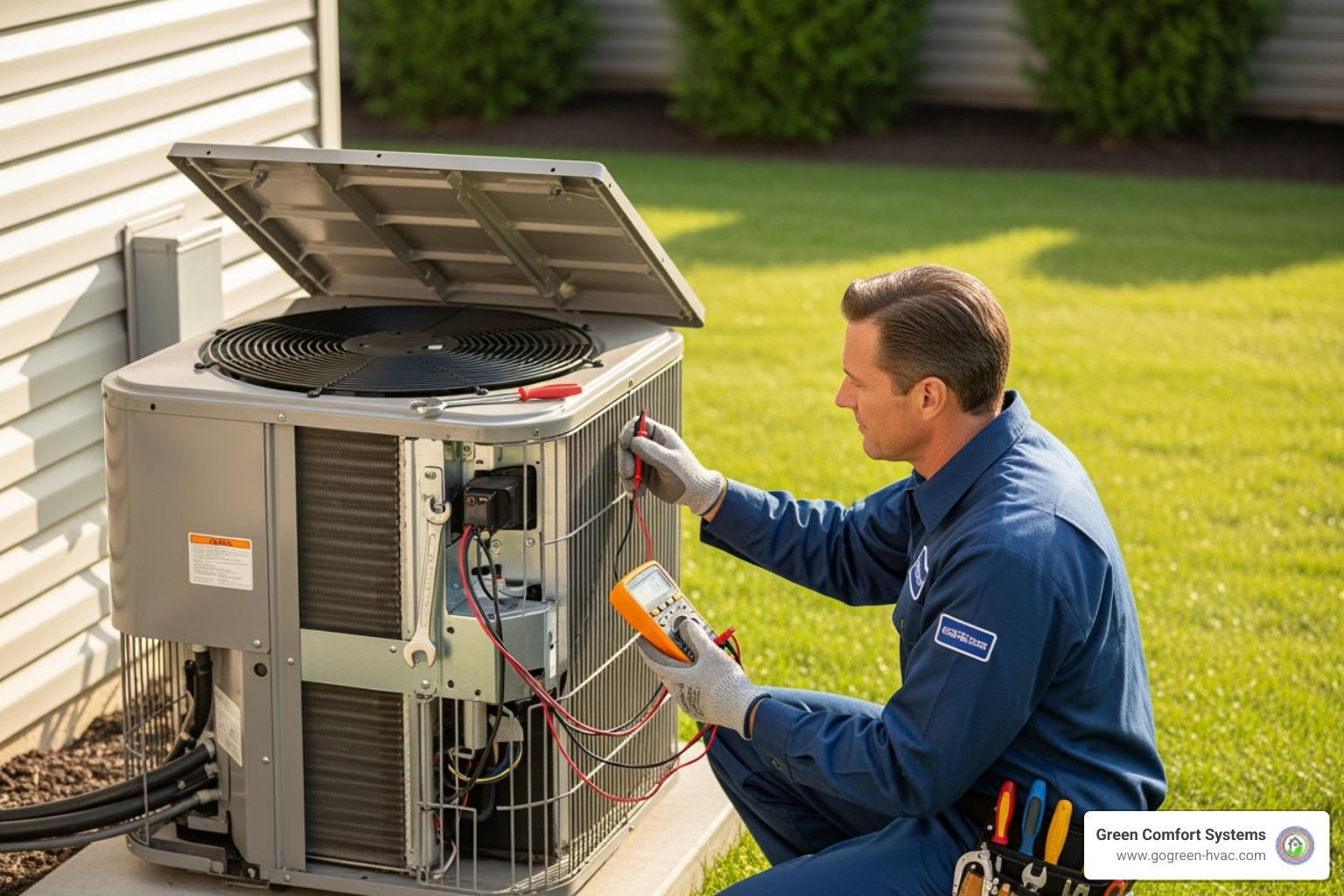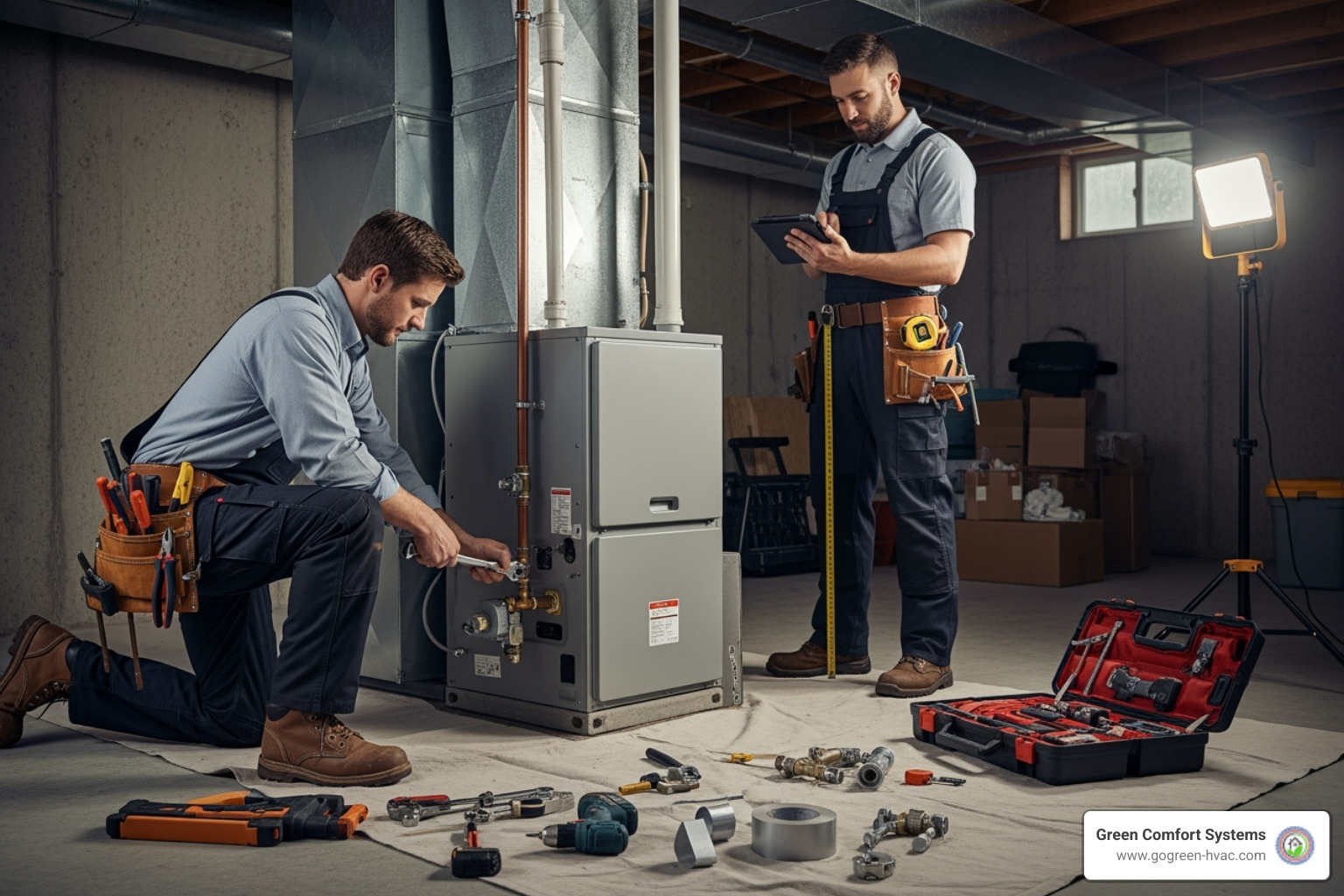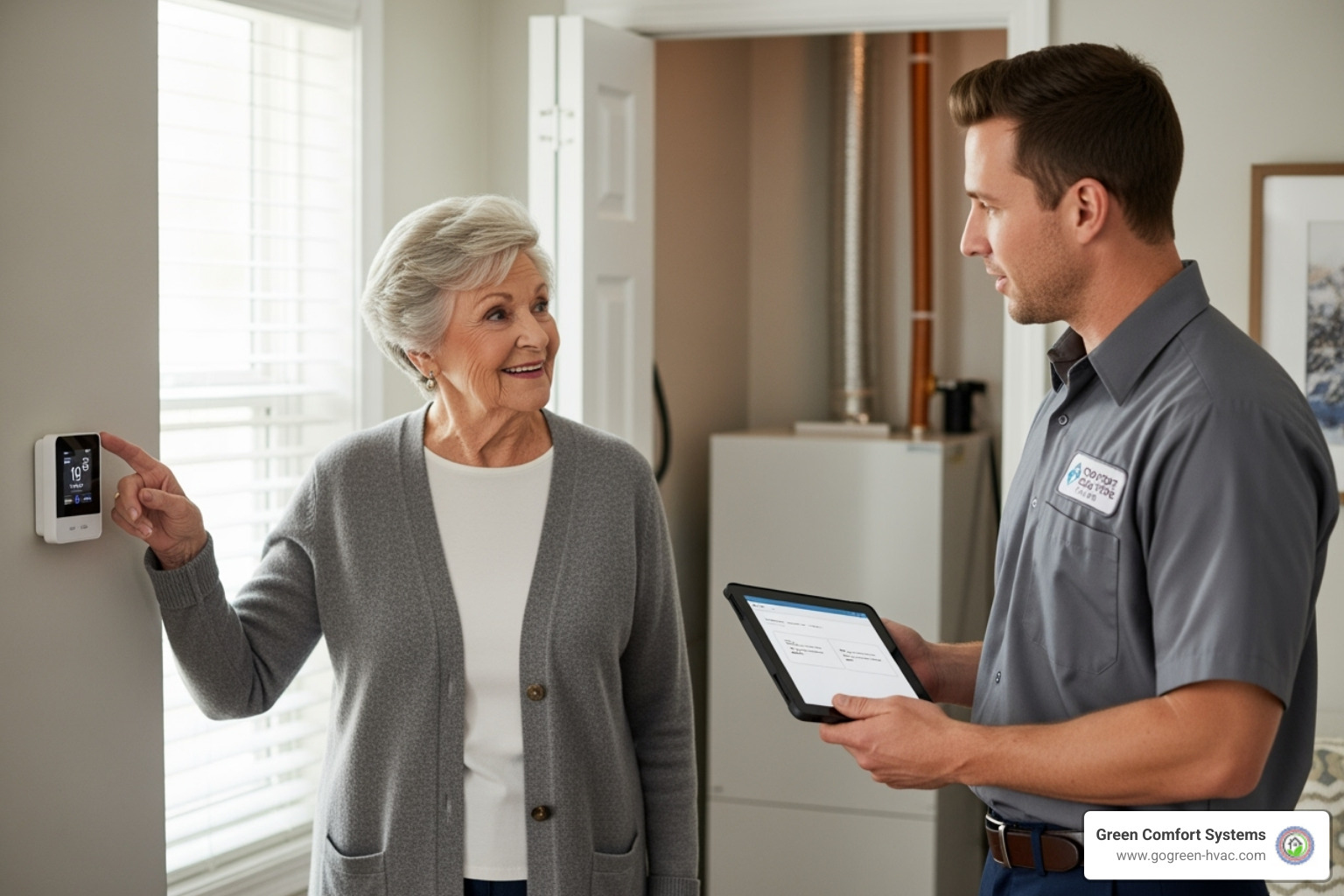Silence the Squeal: How to Quiet a Noisy AC Unit

Understanding Why Your Home is Hot: When Your AC Isn't Cooling
The relief of cool air on a sweltering Rosedale summer day is best. But when you realize your AC not cooling, that relief quickly turns to frustration. You're left sweating and wondering what went wrong.
If your AC is running but not cooling, here are the most common culprits to check first:
- Wrong Thermostat Setting: Ensure it's set to "Cool" and the temperature is lower than your home's current temperature.
- Dirty Air Filter: A clogged filter severely restricts airflow, leading to poor cooling.
- Tripped Circuit Breaker: The outdoor unit or the whole system might have lost power.
- Blocked Outdoor Unit: Debris around the condenser unit can stop it from releasing heat.
This guide covers these common issues and more, outlining simple DIY troubleshooting steps and explaining when it's time to call a professional HVAC technician.
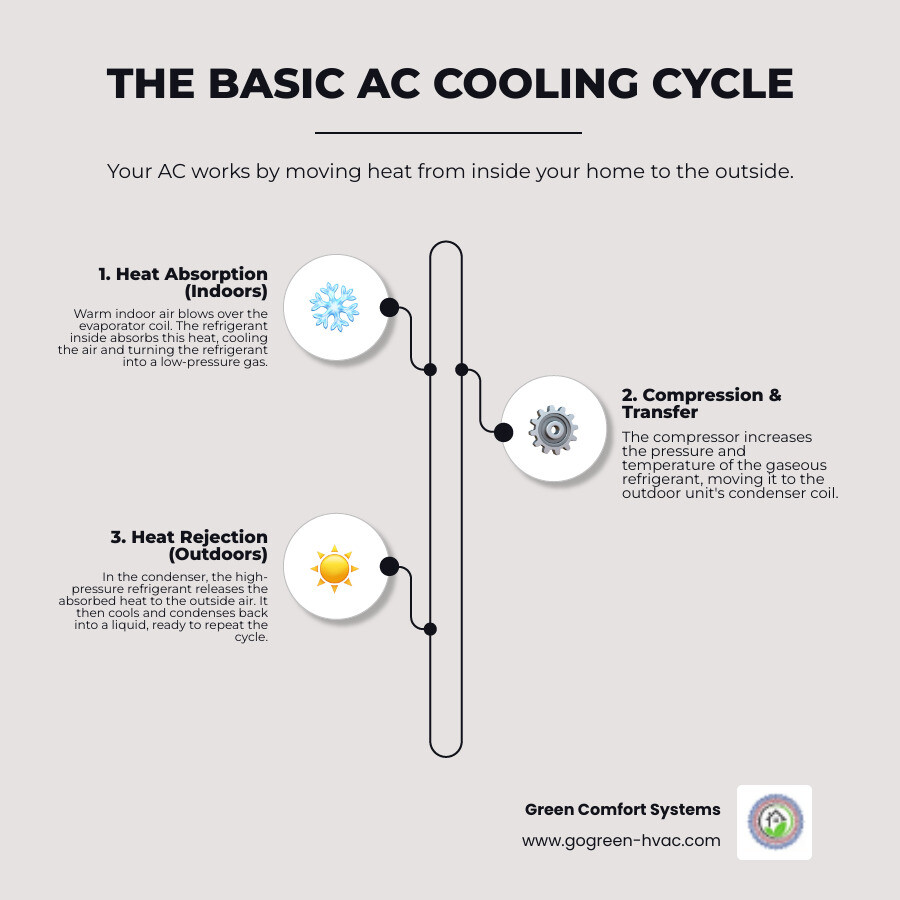
First-Aid for Your AC: Simple Fixes to Try Before Calling for Help
Before you panic about a sweltering Rosedale summer, take a breath. Often, when an AC not cooling properly, the fix is simpler than you think. These basic troubleshooting steps can save you time and money.
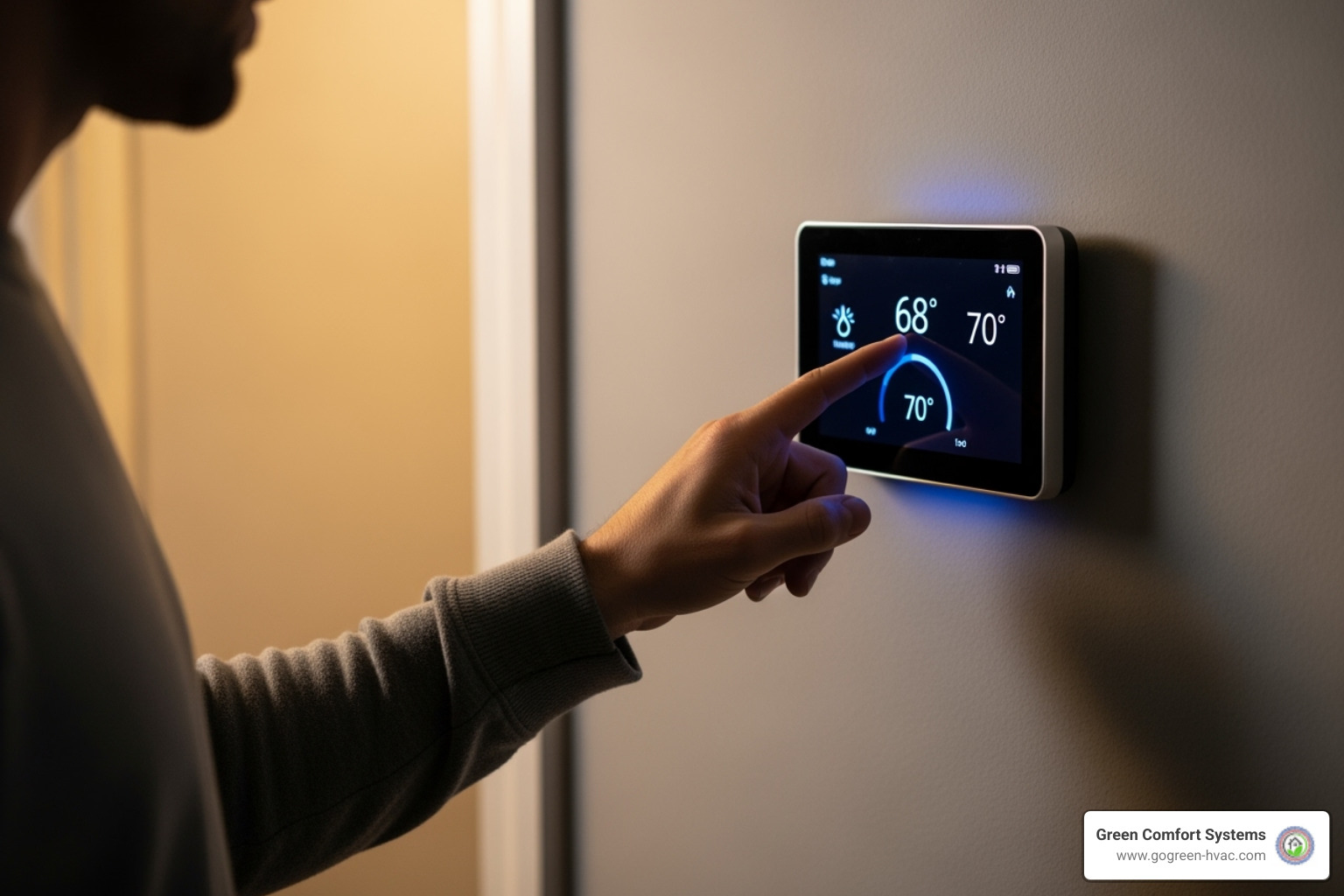
Check Your Thermostat
Your thermostat is your AC's command center, so if your house feels like a sauna, check here first to ensure it's giving the right orders.
First, check that cool mode is actually selected. It's surprisingly easy for the thermostat to get bumped to "Heat" or "Off." The temperature setting should also be lower than your home's current temperature.
If you have a smart thermostat that's acting up, try a quick reboot. And don't forget to check the batteries; a blank screen or sluggish response is a key indicator.
Pay attention to your fan setting. If it's on "AUTO," the fan only runs during a cooling cycle. If it's on "ON," the fan runs constantly, which can blow uncooled air if the compressor isn't working.
Inspect and Change the Air Filter
A dirty air filter is the number one reason for an AC not cooling effectively. Think of it as your AC's lungs—when clogged with dust and pet dander, the whole system struggles. This restricted airflow forces your AC to work overtime and can even cause the evaporator coil to freeze.
The EPA explains how air filters work to trap particles. We recommend checking your filter monthly and replacing it every 1-3 months, especially during peak summer usage.
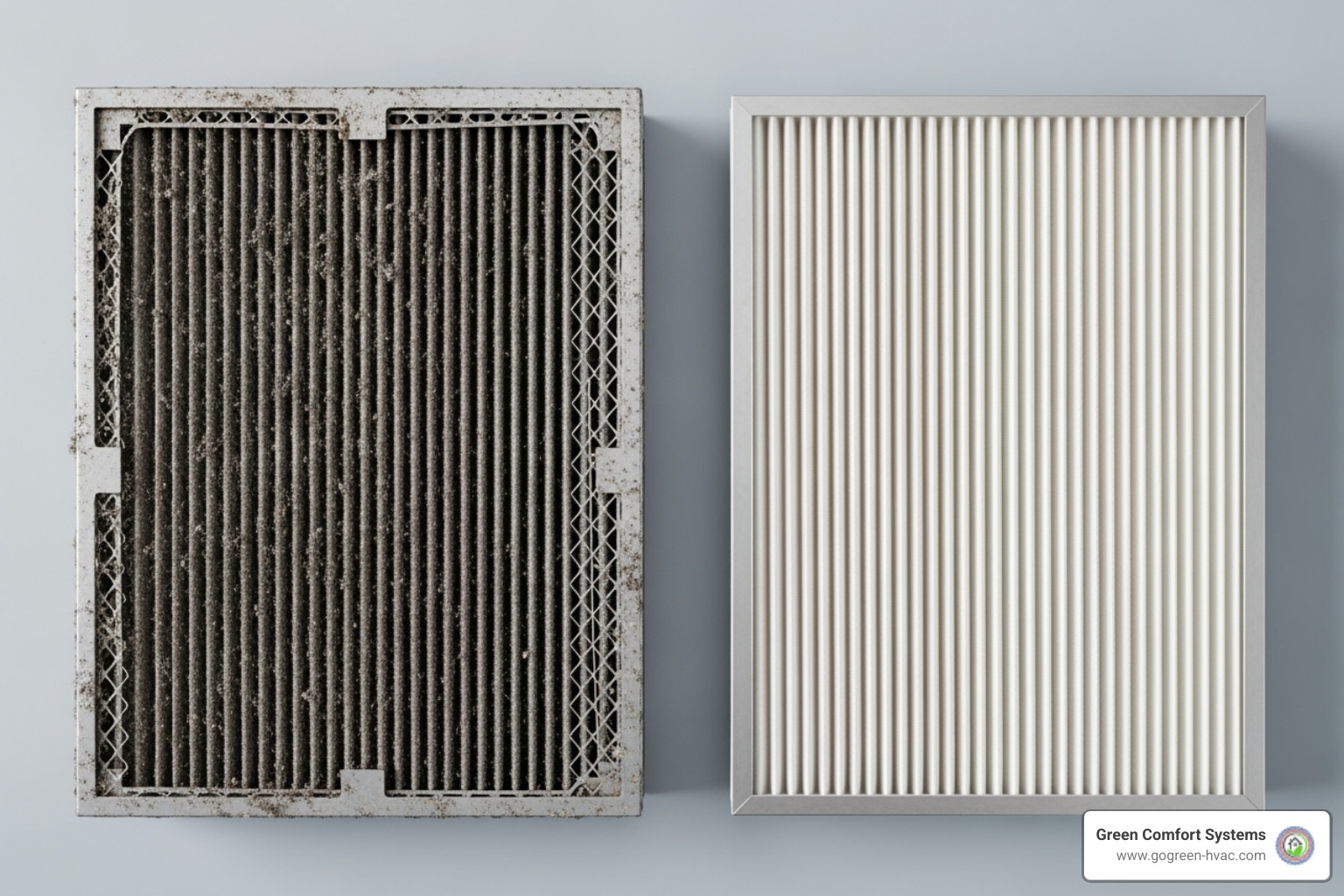
A clean filter not only helps your AC cool better but also improves your home's air quality.
Look for Tripped Breakers or Power Issues
Your AC might not be cooling if it's not getting power. Air conditioners are power-hungry, and electrical hiccups can happen.
Go to your electrical panel (usually in the basement, garage, or a utility closet) and look for tripped breakers. They will be in the "OFF" position or stuck between "ON" and "OFF."
If you find one, flip it firmly to "OFF" first, then back to "ON." Give your system a few minutes to restart. Warning: If a breaker trips repeatedly, don't keep resetting it. This indicates a serious problem that requires a professional.
Also, check the outdoor disconnect switch near your condenser unit. It should be in the "ON" position.
Clear the Outdoor Condenser Unit and Indoor Vents
Your outdoor condenser unit releases the heat your AC pulls from your house. If it's surrounded by debris or blocked by plants, it can't do its job effectively.
Ensure there's at least two feet of clearance around the outdoor unit. Clear away grass clippings, leaves, and dirt, and trim back overgrown shrubs. You can gently rinse the coils with a garden hose after turning off the power at the disconnect switch.
Inside, check your supply and return vents. Make sure they aren't blocked by furniture, rugs, or curtains. Blocked vents create hot spots and force your AC to work harder.
For thorough maintenance that covers all these details, our AC Maintenance service ensures your system runs efficiently.
Uncovering the Root Cause: Why Your AC is Not Cooling
If the simple fixes didn't solve your AC not cooling problem, it's time to look at more complex issues. These typically involve the AC's inner workings and require a professional's touch.
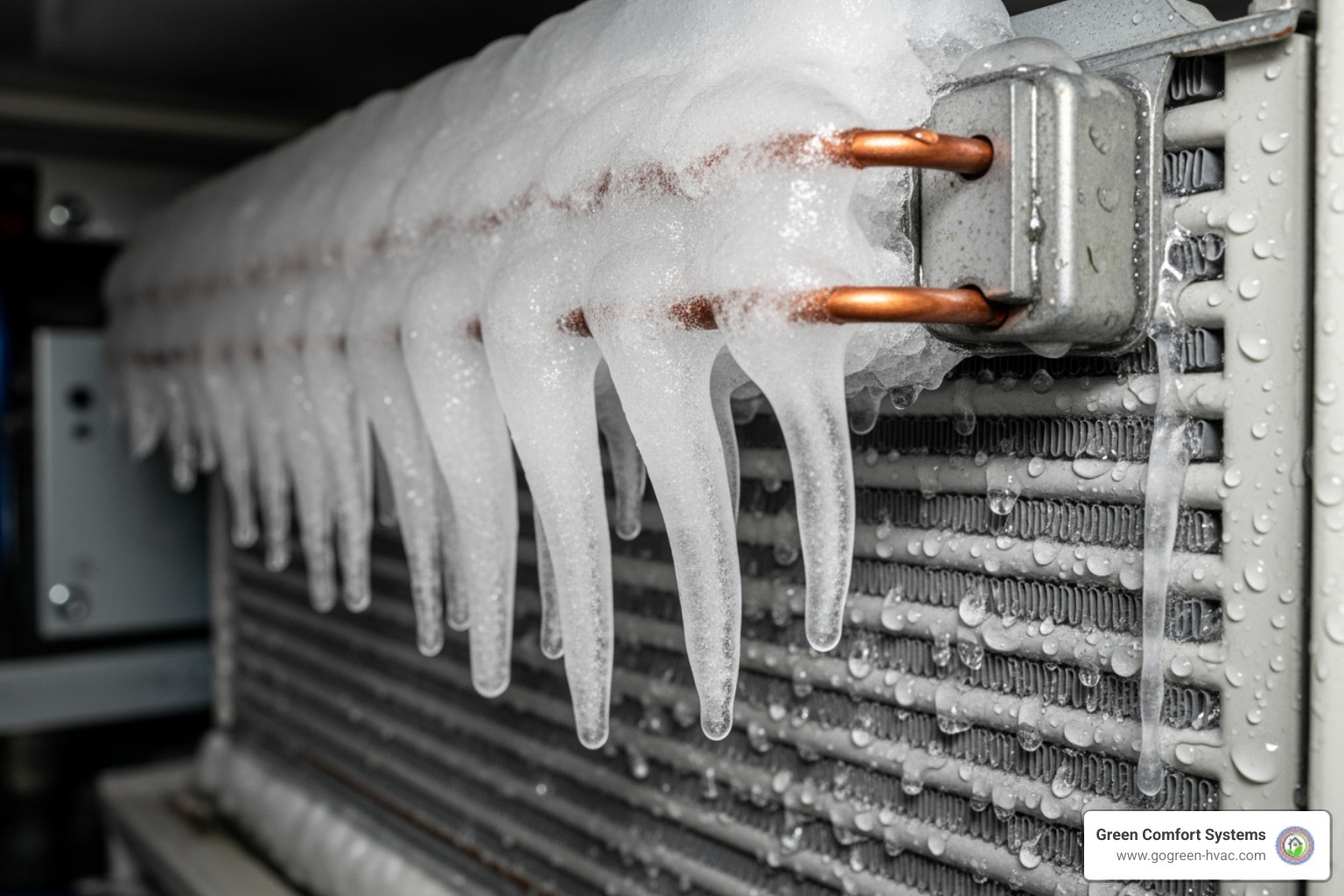
The Refrigerant's Role in an AC Not Cooling
Refrigerant is your AC's lifeblood. This chemical absorbs heat from inside your home and releases it outside. As a sealed system, refrigerant levels should remain constant unless there's a leak.
When your AC is low on refrigerant, it can't absorb enough heat, causing it to blow lukewarm or warm air. The only reason for low refrigerant is a leak.
Signs of a leak include hissing or bubbling sounds, ice on the copper refrigerant lines, or your AC running much longer than usual. Leaking refrigerant harms your AC's performance and the environment. If you suspect a leak, call a certified technician immediately to find and fix it, then recharge your system professionally. Running an AC with low refrigerant can destroy the compressor, leading to a major expense.
Frozen Evaporator Coils: A Common Reason for an AC Not Cooling
When evaporator coils freeze, they become a block of ice that can't absorb heat from your home's air. This prevents them from doing their job, leaving you with an AC not cooling your space.
Restricted airflow is the biggest cause of frozen coils. A clogged air filter or blocked return vents mean not enough warm air flows over the coils, causing them to freeze. A faulty blower motor can also be the culprit.
Low refrigerant levels and dirty coils can also lead to freezing. If you see ice, turn off your AC immediately and switch your thermostat to "Fan Only" to help it melt. Do not chip the ice off, as this can damage the delicate coils. Once thawed, check the air filter and vents.
If the coils freeze again, it's a strong sign of low refrigerant or another underlying issue that needs professional attention. Continuing to run a frozen AC can seriously damage your compressor.
Dirty Coils and Leaky Ducts
Even without freezing, dirt on your indoor evaporator and outdoor condenser coils can sabotage your cooling. Dirt acts as insulation, blocking the heat exchange process.
While you can rinse your outdoor condenser coils, evaporator coil cleaning usually requires professional tools and expertise to avoid damage.
A sneaky problem we often see is leaky ductwork. Your ducts are highways for cool air. When there are holes, cracks, or loose connections, conditioned air escapes into attics, crawl spaces, or walls before it reaches you.
This leads to uneven cooling and wasted energy. Damaged ducts are a common cause of an AC working harder but cooling less effectively.
Electrical and Mechanical Failures
Complex electrical and mechanical parts can also fail. This might look like the system running without cooling, or not starting at all.
A failed capacitor can prevent your compressor and fan motors from starting. You might hear a humming or clicking sound from the outdoor unit.
The contactor is an electrical switch that powers the compressor and outdoor fan. If it malfunctions, these components won't run.
Compressor issues are more serious. The compressor is the heart of your AC. A failed compressor means the unit may run but won't cool.
Fan motor problems in either the indoor or outdoor unit will compromise airflow and heat transfer, causing the system to overheat and shut down.
These issues involve high-voltage electricity and are dangerous to tackle yourself. When you suspect any of these problems, it's time to call the experts for AC Repair. Our technicians can diagnose and fix these problems safely.
Know Your Limits: When to Call an HVAC Professional
While we encourage DIY troubleshooting, some problems require a professional. There's a fine line between a handy fix and an expensive disaster. Knowing when to call for help protects both you and your AC system.
Attempting complex repairs without training can lead to damaged components, a voided warranty, or even personal injury from electrical shock or chemical exposure. Professional HVAC technicians have the tools and training to handle these situations safely.
Refrigerant Leaks
If you suspect a refrigerant leak, this is a job for professionals. Handling refrigerants is regulated by the EPA and requires special certification. These chemicals can be harmful to the environment and your health.
Refrigerant exposure can cause dizziness and breathing difficulties. You can find more details about refrigerant poisoning information to understand the risks. Our certified technicians can safely detect and repair leaks, then recharge your system to precise manufacturer specifications.
Major Electrical and Compressor Problems
For electrical issues beyond a simple breaker reset, call the pros. Capacitor replacement, burnt wires, or compressor problems involve high-voltage electricity that can be fatal. It's not worth the risk.
Compressor problems are tricky; a failure can mimic other, less expensive issues like a bad capacitor. A professional diagnosis can save you money by identifying the true problem.
Our experienced technicians can safely work with complex electrical systems, quickly diagnosing the issue to ensure you get the right repair at the right price.
Persistent Issues
You've checked the thermostat, changed the filter, cleared the outdoor unit, and reset the breaker, but your AC not cooling problem persists. Maybe the coils keep refreezing, or a breaker keeps tripping.
These recurring problems signal a deeper issue. Ignoring them usually makes them worse and more expensive over time, potentially leading to a major system failure.
Our team provides expert AC Repair in Baltimore, MD and surrounding areas. We solve those tricky, recurring problems to restore your peace of mind and comfort. Don't let a stubborn AC issue ruin your summer.
The Best Fix is Prevention: How Maintenance Keeps You Cool
The best offense is a good defense, and this is especially true for your air conditioner. Regular maintenance is a health check-up for your AC, catching small issues before they become major problems that leave you with an AC not cooling when you need it most.
Your AC works hard during sweltering Maryland summers and deserves the same care as your car.
The Value of Regular Tune-Ups
During an annual AC tune-up, our technicians thoroughly inspect every component. We clean both evaporator and condenser coils, check refrigerant levels for proper balance, test electrical components like capacitors and contactors, and lubricate moving parts.
We also verify that airflow is optimal throughout your system. Catching a worn capacitor during a tune-up is much cheaper than replacing a failed compressor later. Plus, many manufacturers require regular maintenance to keep your warranty valid. Our AC Maintenance services are designed to keep your system running efficiently year after year.
Is Your AC the Right Size?
Sometimes, an AC not cooling effectively isn't due to a malfunction but because it's the wrong size for your home.
An undersized unit runs constantly without ever reaching the target temperature, leading to high energy bills. Conversely, an oversized unit cools the space too quickly and shuts off before it can properly dehumidify the air, leaving you feeling sticky. This is called short cycling.
Determining the right size requires a professional load calculation that considers your home's square footage, insulation, windows, and more. When we handle AC Installation, we ensure your new system is perfectly matched to your home.
Extending Your AC's Lifespan
With proper care, your air conditioner can last 10-15 years, and sometimes longer. Regular maintenance is the key to achieving this lifespan.
By reducing strain on components, keeping the system clean, and catching problems early, you give your AC the gift of longevity. It's more cost-effective to invest in annual maintenance than to replace your system prematurely.
At Green Comfort Systems, we're committed to your comfort and our planet. That's why we plant trees for every service and installation we complete, ensuring a cooler future for everyone.
Frequently Asked Questions about AC Cooling Problems
When your AC not cooling properly leaves you sweating and stressed, you likely have questions. Here are answers to the most common concerns we hear from homeowners in Rosedale and surrounding areas.
Should I turn off my AC if it's not cooling?
Absolutely, yes. Continuing to run a malfunctioning AC can cause more damage, especially to the compressor, its most expensive component. This extra strain can turn a small problem into a major one. If your coils are frozen (a common reason for an AC not cooling), running the system will only worsen the ice buildup. Turn off the cooling function immediately but leave the fan on to help thaw the ice. This step can prevent costly repairs.
How do I know if my AC is low on refrigerant?
The most common signs of low refrigerant are your AC blowing warm or lukewarm air and ice forming on the copper refrigerant lines or evaporator coil. You might also hear hissing or bubbling sounds, which indicate a leak. Because your AC is a closed system, low refrigerant always means there's a leak that needs professional repair. Don't ignore these signs, as the problem will only get worse.
What should I do if my AC unit is frozen?
First, turn off the cooling function at your thermostat but leave the fan setting on "ON" or "AUTO." The fan will help circulate air over the ice, speeding up the thawing process. Do not chip away at the ice, as this can damage the delicate fins on your coils. While it thaws (which can take several hours), check your air filter; a clogged filter is the most common cause of freezing. Replace it if it's dirty and ensure all vents are unblocked. After the unit has completely thawed, you can try running it again. If it refreezes, this indicates a deeper problem like low refrigerant, and you should call a professional to prevent further damage.
Conclusion
When you're dealing with an AC not cooling, your home can quickly become uncomfortable. As this guide shows, many cooling problems have straightforward DIY solutions.
Start with the basics: check your thermostat, replace the air filter, check for tripped breakers, and clear debris from the outdoor unit. These simple steps solve a surprising number of issues.
However, issues like refrigerant leaks, persistent freezing, and electrical or compressor failures require a trained technician. Attempting these repairs yourself is dangerous and can cause more expensive damage.
The real secret to avoiding a hot house is regular maintenance. Annual care helps your AC run efficiently, last longer, and prevents small problems from becoming major headaches.
At Green Comfort Systems, your comfort can't wait. Whether you need emergency repairs, routine maintenance, or a new system, our team is here to help homeowners throughout the Baltimore area. With every job, we plant trees to help keep our planet cool too.
Don't spend another day uncomfortable. Get expert heat pump and AC repair in Forest Hill, MD and surrounding areas. We're ready to restore your cool comfort quickly and professionally.
Book Expert Service Or Contact Us
Other Blogs





Get Financing Today
Get the comfort you deserve, without the financial stress.

Latest Blogs







